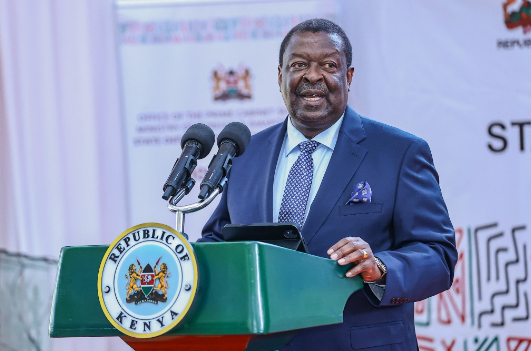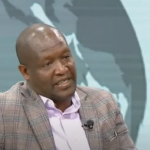The government has underscored the importance of expanding women’s involvement at all levels of peace and security initiatives. Speaking during the high-level regional forum commemorating the 24th anniversary of the United Nations Security Council Resolution 1325 on women, peace, and security, Prime Cabinet Secretary Musalia Mudavadi emphasized that women should not only participate but also take on leadership and decision-making roles.
Mudavadi called for governments to build upon the existing legacy to ensure African women’s inclusion in peace processes and the recognition of their leadership. “As the global security landscape evolves, we must ensure that women’s voices shape responses to these emerging threats, especially those related to climate security. Integrating these issues into our National Action Plans ensures that we, as governments and stakeholders, prioritize them in both policy and practice,” he stated.
While acknowledging the progress made, Mudavadi pointed out the persistent challenges faced by women. He highlighted that women are disproportionately affected by conflict and are often targets of violence and marginalization. Additionally, he noted that women’s participation in peace processes remains limited, leading to the neglect of their needs and perspectives in post-conflict reconstruction.
Mudavadi also drew attention to the proliferation of small arms and light weapons, which exacerbate these challenges and pose significant threats to regional peace and security. “These easily accessible and often unregulated weapons fuel violence, exacerbate conflicts, and destabilize communities. They perpetuate cycles of violence that make women and children more vulnerable to harm,” he lamented.
As nations confront these issues, Mudavadi stressed the importance of collaboration in regulating and preventing the spread of small arms to ensure safety and stability in the region. He remarked that the increasing recognition of the intersectionality between gender, peace, and security presents a unique opportunity to strengthen commitments and fully realize the principles of UNSCR 1325.
He noted that African women have a rich history as peacebuilders, with significant roles in mediating conflicts and advocating for peace in countries like South Sudan, Somalia, Kenya, and Uganda. “The legacy of African women in peacebuilding is a testament to the power of their resilience, courage, and leadership,” Mudavadi affirmed. He emphasized that achieving these goals requires the support of all stakeholders, including governments, civil society, regional organizations, international partners, and local communities.
Looking ahead, Mudavadi urged countries to recognize that UNSCR 1325 is not solely a resolution for women; rather, it is a mandate for everyone. He described it as a call to action for fostering a more inclusive, just, and peaceful world. “We must renew our commitments to implementing the Women, Peace, and Security agenda. This includes ensuring that women’s voices are central to peace processes, their rights are protected in conflict, and that they have the resources and support they need to lead,” he stated.
He pointed out that the theme of the conference, “Fostering Peace and Inclusivity in East and Southern Africa: Effective Strategies for Advancing the Women, Peace, and Security Agenda,” serves as a reminder that women bear the heaviest burdens during crises and simultaneously play a crucial role in conflict prevention, peace negotiations, peacebuilding, peacekeeping, humanitarian responses, and post-conflict reconstruction.
“Our collective success as a continent, including achieving the African Union’s Agenda 2063 and the goal of Silencing the Gun by 2030, relies heavily on the meaningful inclusion of women in these conflict management processes. We must reflect on the journey we have traveled and amplify the call to action for the full participation and leadership of women in fostering sustainable peace,” Mudavadi affirmed.




